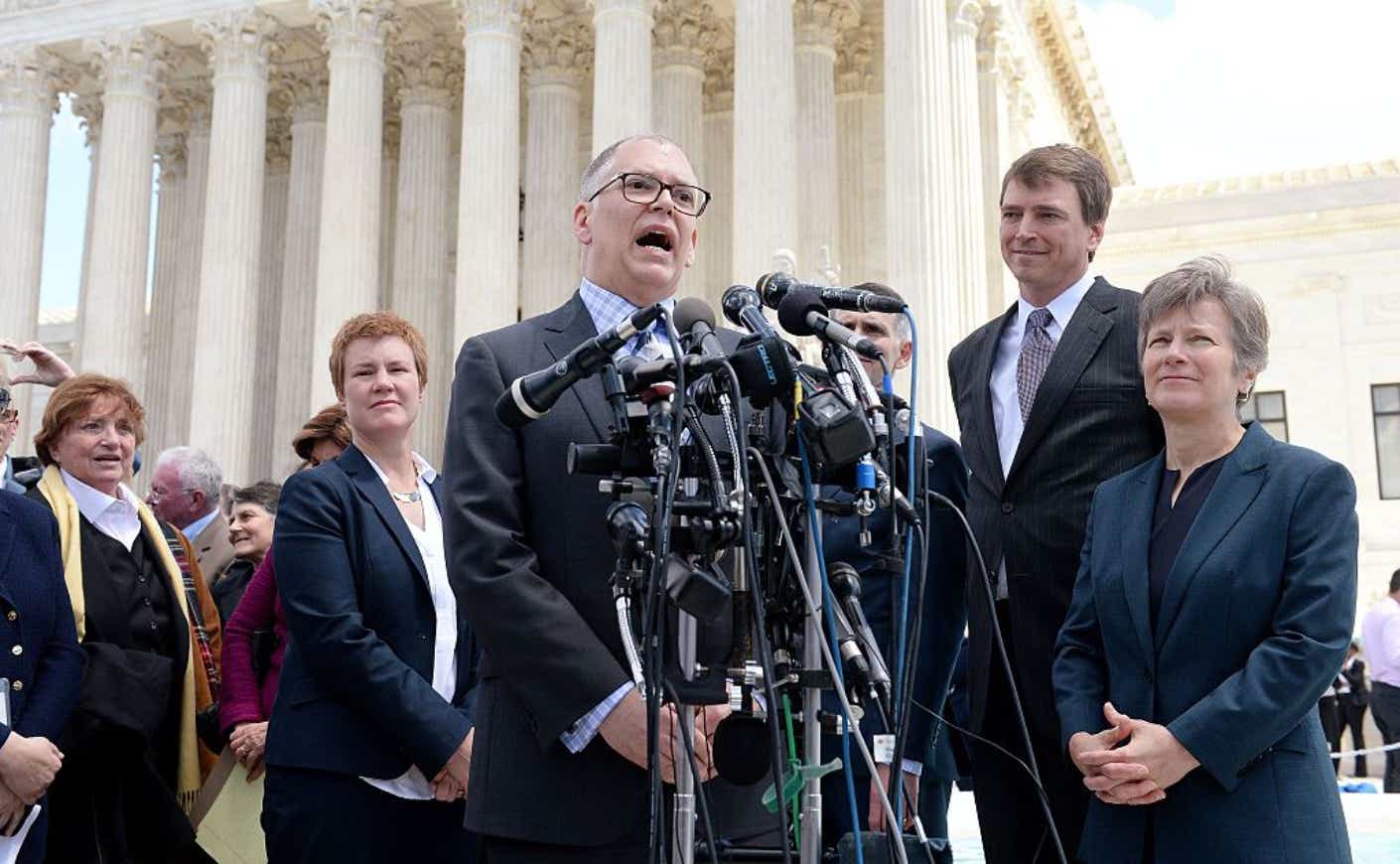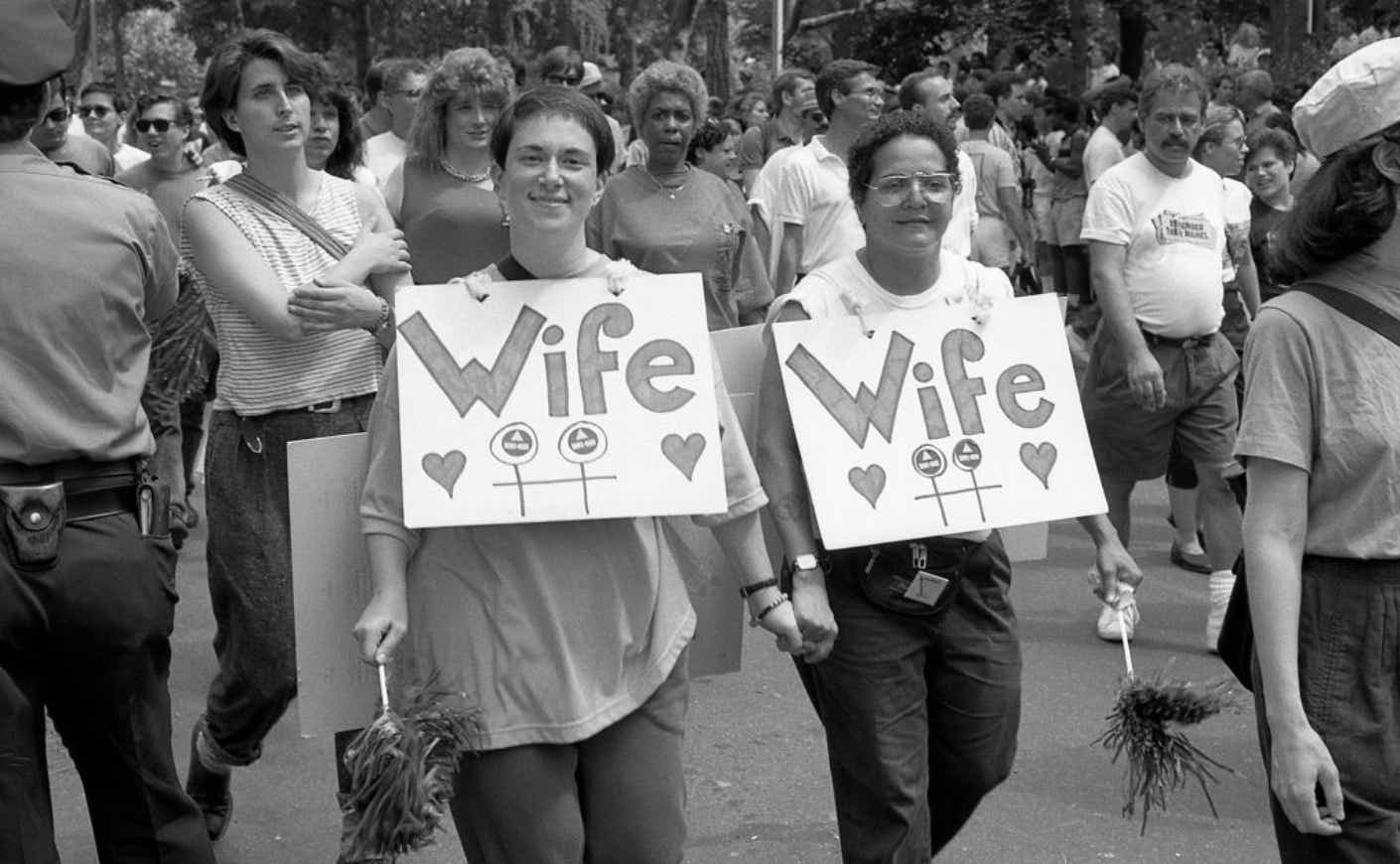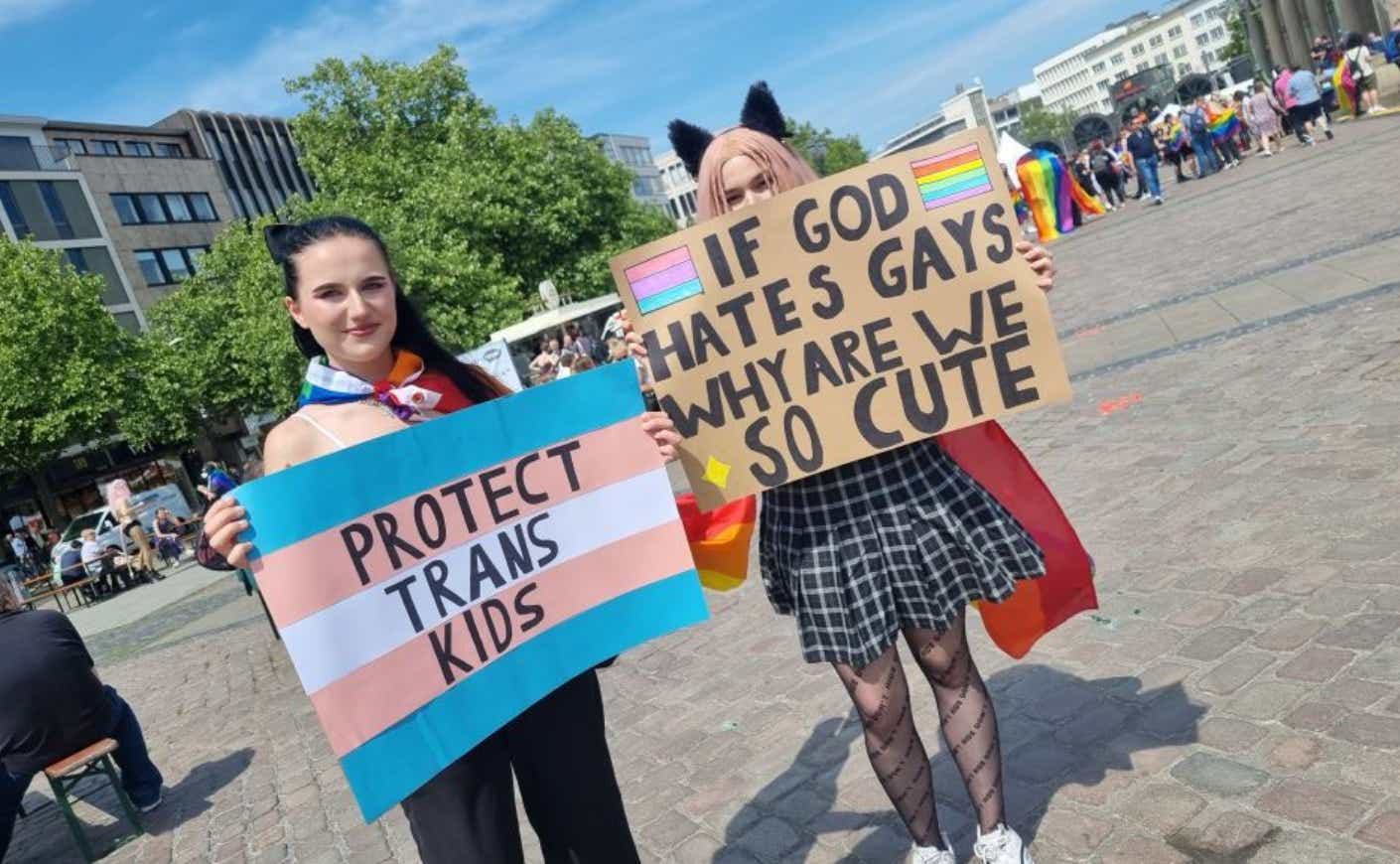The Supreme Court has put us on a slippery slope, and more rights could be in danger.
The nation is still coming to fully understand the significant consequences of the Supreme Court’s decision to strike down Roe v. Wade and the abortion protections that came with it, but legal scholars are already bracing for the next big constitutional battle.
Advocates, activists, and everyday Americans alike worry that the controversial ruling on abortion paves the way for a challenge to the legality of same-sex marriage. The highest court in the land is currently stacked with a 6-3 conservative supermajority, and now that observers have seen how that slant can dismantle a decision like Roe (which protected access to abortion for nearly 50 years), alarm bells are ringing that marriage equality, which only got nationwide protection in 2015, is next on the chopping block.
Marriage and abortion may seem like two unrelated issues, but GLAAD President and CEO Sarah Kate Ellis sees a “direct line” between the two.
“The connection is about personal liberty and the right to control our own bodies and destinies, including deeply personal healthcare decisions like abortion and birth control, and the right to marry who we love,” Ellis tells KCM.
Congress is thinking the same way. On July 18, the Respect for Marriage Act was introduced in the House of Representatives, and members say they expect the bill to receive a vote on the floor this week. If passed, the law would enshrine federal protections for marriage equality by officially repealing the Defense of Marriage Act, which was made obsolete by the 2013 Supreme Court case Obergefell v. Hodges, but which does technically remain on the books — and that’s especially important after Justice Clarence Thomas’s statement that the court “should reconsider” that and other monumental rulings.
The legal thinking that led to the downfall of abortion rights creates a slippery slope for not just same-sex marriage, but potentially the most rudimentary rights and safety for the LGBTQ community. And while this new bill in Congress could make inroads to protect those rights, there’s doubt about whether enough Republican lawmakers will support it, leaving the future of marriage equality looking quite uncertain.
“The red flag has been raised,” says Shannon Gilreath, a professor of law at Wake Forest University and author of The End of Straight Supremacy. “We’re on notice now.”
How did same-sex marriage become legal in the first place?
It’s impossible to consider how marriage equality could be revoked before first understanding how it became a protected right.
The story goes back to 1967, when the Supreme Court decided a famous case called Loving v. Virginia, which solidified the right to marry someone of any race. Then, in 2015, the court’s decision in Obergefell v. Hodges used the precedent set in Loving to determine that the same marital freedoms that apply to race are also valid when it comes to sexual orientation.
“Marriage is a fundamental right, guaranteed by what’s called substantive due process under the U.S. Constitution,” Gilreath explains. “It was recognized as such in Loving for interracial couples who had been denied access to marriage, and [in Obergefell], the court said same-sex couples pose no new legal question.”

But the root of the matter is more complicated, and it has to do with whether the Constitution guarantees particular rights even if they aren’t specifically enumerated within that document.
The Fourteenth Amendment says that no state shall “deprive any person of life, liberty, or property, without due process of law; nor deny to any person within its jurisdiction the equal protection of the laws.” For many years, the Supreme Court was guided by an understanding that this amendment protected rights that extended beyond what’s specifically mentioned in the text — including marriage.
But now, Gilreath says he’s observed the court pivot back to an assumption that only “textually explicit rights” — those specifically outlined in the Constitution — are guaranteed.
“That theory seems to now be driving the court’s open hostility to unenumerated federal rights,” he says. “And if that attitude prevails, it will be a seismic shift in the way the Constitution relates to the average American citizen.”
But how does that square with the popular idea of the Constitution as a “living document”? The current court’s way of thinking is actually in direct opposition to that concept, Gilreath says.
“One theory of the Constitution, famously championed most recently by Antonin Scalia, is the idea that the Constitution can only mean what it meant to the drafters,” he explains. “So in that view, the Constitution is a static document. It isn’t living.”
And now that the Supreme Court is filled with justices who subscribe to that way of thinking, our country’s founding principles are in danger of becoming a “trapped-in-the-past document” that doesn’t actually relate to modern American life.
How does the Roe decision affect the framework of marriage equality?
In the opinion that struck down Roe v. Wade, Justice Samuel Alito justified the decision by writing that “the Constitution does not confer a right to abortion,” adding that without Roe, it would once again be up to state governments to legislate reproductive rights on their own terms.
That’s where the connection between abortion and same-sex marriage arises — neither is concretely outlined as a right within the Constitution.
The opinion did address that, in an attempt to frame the decision on Roe as a singular ruling. “We emphasize that our decision concerns the constitutional right to abortion and no other right,” Alito wrote. “Nothing in this opinion should be understood to cast doubt on precedents that do not concern abortion.”
Some find that hard to believe, including GLAAD’s CEO.
“Justice Alito’s draft opinion criticizes rulings that have advanced LGBTQ Americans’ right to be safe and belong in society,” Ellis says. “Marriage equality and our right to our private relationships have had zero negative impact on Justice Alito’s marriage or anyone else’s.”

And although Alito made an effort to separate conversations about abortion from conversations about other rights, Clarence Thomas said the quiet part out loud when he explicitly wrote that SCOTUS’s findings about Roe v. Wade merit a re-examining of cases like Obergefell v. Hodges.
That said, the court’s ruling in Obergefell currently is the law of the land. So how might same-sex marriage once again become a point of legal debate?
Gilreath hypothesizes it would stem from a government official on the state level who goes rogue, like former Kentucky county clerk Kim Davis infamously did in 2015, when she denied marriage certificates for same-sex partners.
“It would start with a state official refusing to issue a license to a same-sex couple, and then that couple would bring a suit against not only that official, but the state, seeking an injunction forcing the state to issue the license,” Gilreath says. “At that point, the state could argue in its own defense that there is no right to access marriage by same-sex couples, and that would make the constitutional question ripe for a decision by the court.”
Nationwide support for same-sex unions just hit a record high, with 71% of Americans supporting marriage equality, but the tide of public opinion is no match for the power of the Supreme Court. After all, a recent poll found 7 in 10 Americans believe abortion is a private decision between a pregnant person and their doctor, and yet in a matter of weeks the court will formally allow states to take that decision away.
What other LGBTQ rights could be at risk?
Ellis says the current political climate reminds her a bit of the original fight for marriage equality, when nearly 30 states sought to ban same-sex marriage and constitutional amendments were put forth to make the same effort at the federal level. But in 2022, anti-queer forces have broadened the scope of these attacks.
“What’s different this time are the targets,” Ellis says. “LGBTQ youth, who don’t have a voice or vote, are facing extremists who want to censor conversation in classrooms, ban books, and restrict their healthcare that is safe and evidence-based. … No one’s ability to be themselves and grow up in safety and peace should be threatened like this.”
Want a couple examples of how LGBTQ youth are being targeted? Consider the controversial “Don’t Say Gay” bill in Florida, which was officially signed into law by Gov. Ron DeSantis in March and subsequently inspired similar legislation in a handful of states. Then there are laws around the country challenging the right to healthcare for transgender youth.
Ellis points out that 29 states have no statewide protections against the discrimination of LGBT people, which “creates two Americas — one where you can be protected against harmful discrimination, and one where you are on your own.”
“We are seeing and hearing from parents who are considering leaving their homes and extended families to move to states that won’t discriminate against them,” Ellis says. “It’s simply unacceptable that people have to flee to be free in the United States of America.”

Gilreath says the Supreme Court’s focus on solely protecting rights that are specifically enumerated in the Constitution means that marriage rights aren’t the only thing that could be rolled back. One example is Lawrence v. Texas, the 2003 case that barred states from criminalizing intimacy between same-sex couples.
“At the time Lawrence v. Texas was decided, 13 states had laws that made the act of so-called ‘sodomy’ some variation of a crime,” he explains. “Those laws don’t go away. They’re still on the books, they’re just [currently] unenforceable. So now that the court is in the business of striking down non-textually explicit fundamental rights, other liberties could be in as much danger as marriage.”
All these threads add up to a worrisome tapestry for the LGBTQ community, but Ellis says there are clear ways to tackle the threats head on.
“All LGBTQ people and our allies need to be calling their senators and demanding they support the Equality Act,” she says. “We need you to speak up at your schools and workplaces, demanding your employers protect our families and your friends’ families. You should register to vote and make voting a part of your life — because your life and future depend on it.”









